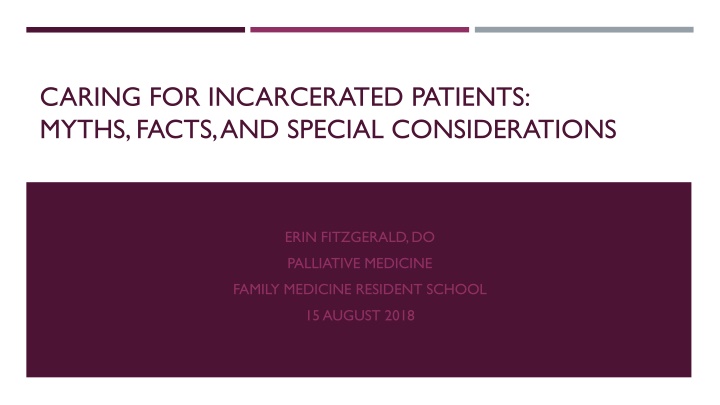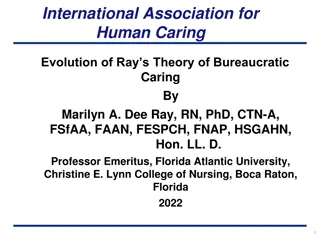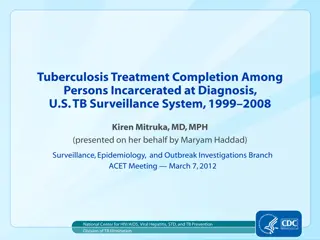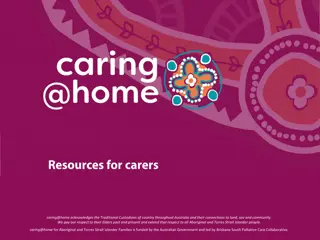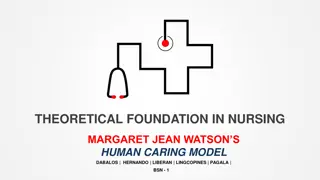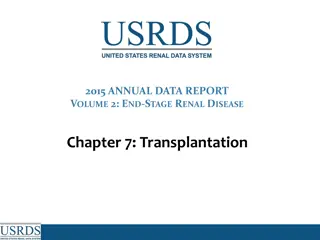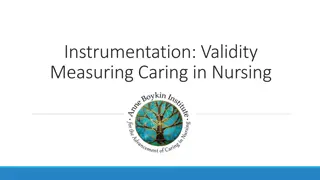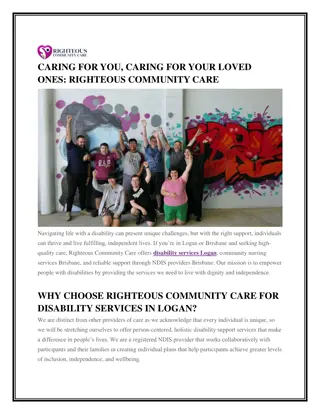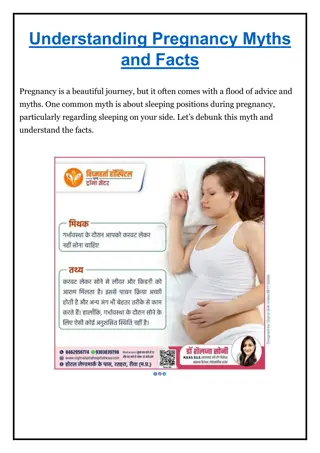Caring for Incarcerated Patients: Myths, Facts, and Special Considerations
This presentation delves into the common myths surrounding care for incarcerated individuals, explores the complexities of providing healthcare in correctional systems, and offers best practices for safe transitions of care. It highlights the unique challenges and disparities faced by incarcerated patients, emphasizing the importance of advocacy and compassionate healthcare delivery.
Download Presentation

Please find below an Image/Link to download the presentation.
The content on the website is provided AS IS for your information and personal use only. It may not be sold, licensed, or shared on other websites without obtaining consent from the author.If you encounter any issues during the download, it is possible that the publisher has removed the file from their server.
You are allowed to download the files provided on this website for personal or commercial use, subject to the condition that they are used lawfully. All files are the property of their respective owners.
The content on the website is provided AS IS for your information and personal use only. It may not be sold, licensed, or shared on other websites without obtaining consent from the author.
E N D
Presentation Transcript
CARING FOR INCARCERATED PATIENTS: MYTHS, FACTS, AND SPECIAL CONSIDERATIONS ERIN FITZGERALD, DO PALLIATIVE MEDICINE FAMILY MEDICINE RESIDENT SCHOOL 15 AUGUST 2018
DISCLOSURES none
OBJECTIVES Identify most common myths related to caring for patients who are incarcerated Understand factors making care for inmates more complex Provide introduction to correctional systems Outline best practices for safe discharges and transitions of care for inmates Empower residents to advocate for incarcerated patients
CORE VALUES UNM SOM Excellence and accountability Compassion in patient care and for the lives and conditions of all of New Mexico s people Diversity Integrity, professionalism, and ethical behavior that embodies the principles of altruism, beneficence and justice; promotes patient care, learning, research and productivity through relationships based on courtesy, civility and respectful communication; and is worthy of the trust and respect given to us as teachers, scholars and healers Social responsibility demonstrated by discovery and teaching about the social, economic, and cultural contexts of New Mexico peoples health; commitment to health promotion and disease prevention; and by self-evaluation of the access to and quality and distribution of our health care professionals and services Creativity and innovation
FUN FACTS ABOUT INCARCERATION AND INCARCERATED ADULTS USA incarcerates more people per capita than any other nation 750 per 100,000 (75 in Norway, 119 in china, 148 uk, 628 in Russia) Prison population has quadrupled in last 25 years Majority of inmates are male, under 35, Black or Hispanic. 10% are veterans. Fastest growing incarcerated population is women. In 2009, 1% of US adults relied on jailers for healthcare Incarcerated adults have higher rates of DMT2, active asthma, HTN, infectious disease (inmates have rates of infectious disease like HIV, Hep B and C, Tb of 21%, general population rate is 5%)
FUN FACTS ABOUT INCARCERATION AND INCARCERATED ADULTS Inmates are less likely to see provider for chronic condition Inmates are less likely to get lab tests Inmates are less likely to continue meds during transitions (hospital to jail, prison to home) Inmates are less likely to have medical attention after serious injury Death by suicide leading cause of death in jail and rate is increasing
MENTAL ILLNESS IN INCARCERATED ADULTS Prevalence of mental illness in prison is 50% (10% in community). 70% of these patients also have some degree of substance use disorder Between 28-52% of Americans with serious mental illness have been arrested at least once 1/3 of adults previously treated with bipolar/schizophrenia are receiving treatment at time of incarceration 2/3 receive treatment while incarcerated
SUBSTANCE USE IN PRISON Random UDS show 10% positive (though this data might be skewed) Widespread substance use in incarcerated patients drugs traded, bartered, etc (cannot always get honest ROS when guards present) Many prescribed meds have potential for misuse/abuse and may be bartered Prison wine or pruno is fermented from fruit or ketchup also used for bartering
POLL Inmates can refuse treatment/procedures A. true B. false C. depends on circumstances D. I have no earthly idea
CONSTITUTIONAL RIGHT TO CARE (AND TO REFUSE/FOREGO CARE) Under the 8thamendment, prisoners must be provided with adequate medical care (under the guise that cruel and unusual punishment is prohibited) Prisoners retain the essence of human dignity inherent in all persons. Respect for dignity animates the eighth amendment prohibition against cruel and unusual punishment a prison that deprives prisoners basic sustenance, including adequate medical care, is incompatible with the concept of human dignity and has no place in civilized society. Justice Kennedy 2011 brown v plata
POLL Inmates cannot be DNR A. true B. false C. depends on circumstances D. I have no earthly idea
DELIBERATE INDIFFERENCE Higher standard than negligence Requires that a prison official knows of and disregards an excessive risk of harm to prisoner by failing to take reasonable steps to abate that risk Examples include: Delay in access to medical personnel Failure to carry out medical orders Unjustifiable reliance on non-medical factors in making treatment decisions
POLL A provider may request that guards step outside to interview/examine a patient in custody A. true B. false C. depends on circumstances D. I have no earthly idea
MEDICAL VS CORRECTIONAL GOALS Mission of medical care is often to diagnose, cure, comfort Mission of jail/prison is to deter, confine, and sometimes rehabilitate The provider-patient relationship must survive the devaluing and undermining of the sense of individual worth and moral agency that correctional facilities are designed to extinguish Nancy Dubler, Ethical dilemmas in prison and jail health care
POLL The warden is the surrogate decision maker for inmates A. true B. false C. depends on circumstances D. I have no earthly idea
POLL A provider may not directly contact family or surrogate decision maker/HCPOA for an incarcerated patient A. true B. false C. depends on circumstances D. I have no earthly idea
SURROGATE DECISION MAKING FOR INCARCERATED ADULTS Like non-incarcerated adults, patients have the right to choose their own surrogate decision maker or healthcare power of attorney. The main difference is that a provider should get permission from the warden to contact the surrogate decision maker
POLL A warden can determine discharge date for incarcerated patient A. true B. false C. depends on circumstances D. I have no earthly idea
Wardens cannot determine medical treatment, discharge dates, level of care. This is up to the provider.
POLL A provider may request compassionate release for an inmate A. true B. false C. depends on circumstances D. I have no earthly idea
CONSIDERATIONS FOR COMPASSIONATE RELEASE What is the jurisdiction? Is the inmate in jail? Convicted? Prison? There are certain convicted crimes for which compassionate release much less likely Create a typed letter on letterhead with your contact info for attorney to include: Dx, Rx, prognosis, functional status (are they ambulatory), is there a guardian? If the charge is serious, what if they improve? What is the structure of the dc location? Attorney gives letter to judge or D.A. Possible court appearance
POLL An inmate can act as a surrogate decision maker for a hospitalized patient A. true B. false C. depends on circumstances D. I have no earthly idea
Incarcerated adults can act as decision makers for their loved ones who are hospitalized This is difficult in practice as it is generally difficult to reach people who are incarcerated by phone (but it is possible)
POLL Jail can provide IV antibiotics if included in the discharge medications/instructions A. true B. false C. depends on circumstances D. I have no earthly idea
SCOPE OF TREATMENT IN JAIL VS PRISON JAIL PRISON and LongTerm Care Unit 9-4 m-f, 24/7 call More comprehensive Yes--verify Rx before dc Can do wound vac All labs available Onsite rads and can do most basic images Yes (PT and speech) Yes, can handle trachs Onsite Physician Formulary IVAntibiotics Wound Care Labs X Ray 9-4 m-f, 24/7 call Limited NO! Limited unlikely to do wound vac All labs available no stat labs Basic plain films on Saturdays PT/OT/speech Oxygen Dialysis NONE. Must be able to do ADLs Yes Outpatient
WHAT CAN WE DO BETTER? According to physicians in DOC and MDC: Keep in mind that hospitals are most common escape route for inmates Direct hand offs for hospital discharges to RNs or MDs/DOs, leave contact number! Med lists ahead of time especially when on IV Abx From clinics, when does patient need follow up? A summary of A&P if possible. Simplify regimens, especially w pain meds Guards (or COs) are generally working overtime. They have a wealth of information. Treat them with kindness. Respect their knowledge of the inmate and the system. But they are NOT medical providers and handoffs to guards are inappropriate.
TIPS TO CARING FOR INMATES Incarcerated adults have constitutional right to health care Stand your ground on medical decisions Make contact with jail/prison before discharge to ensure they can meet medical needs of patients Ask questions and advocate for your patients
TIPS FOR MEDICAL STUDENTS AND RESIDENTS You now know more than most physicians, nurses, social workers about rights of inmates and best practices to caring for inmates spread the word! Take excellent histories especially social histories of your patients and share the info with your team If inmate is at end of life, consider compassionate release and bring it to the attention of your attending! Just as you would update the PCP, make the calls to jail/prison around discharge to do a warm handoff
CONTACT LISTS FOR MDC AND LOS LUNAS PRISON MDC ABQ Jail DOC Los Lunas Prison RN (Med One) 505-839-8827 Director of Nursing 505-839-8727 Dr McMurray 505-839-8833 Chief of Security Ralph Fernandez (c): 505-850-2933 (o): 505-839-8861 Long Term Care Unit RN station 505-383-3529 or 505-383-3526 Dr Beaven 24/7 pager 505-939-1389 Warden Ken Smith 505-383-3325
REFERENCES Know your rights! Aclu national prison project (updated 2012): https://www.aclu.org/other/aclu-national-prison- project Dubler, n. ethical dilemmas in prison and jail health care. 2014. http://healthaffairs.org/blog/2014/03/10/ethical- dilemmas-in-prison-and-jail-health-care/ Hand, m., Mitchell, s., degregory, c. Advance directives in the provision of care for incarcerated adults: a scoping review protocol. Jbi database of systematic reviews and implementation reports. 91-95. 2016. Miller, a. providing principled healthcare in prison. Canadian medical association journal. 185 (4): 183-184. march 2013. Rich, j., allen, s., Williams, b. the need for higher standards in correctional healthcare to improve public health. Journal of general internal medicine. 30(4): 503-507. December 2014. Wilpner, a. et al. the health and health care of us prisoners: results of a nationwide survey. Am j Public Health. 99 (4): 666-672. April 2009
